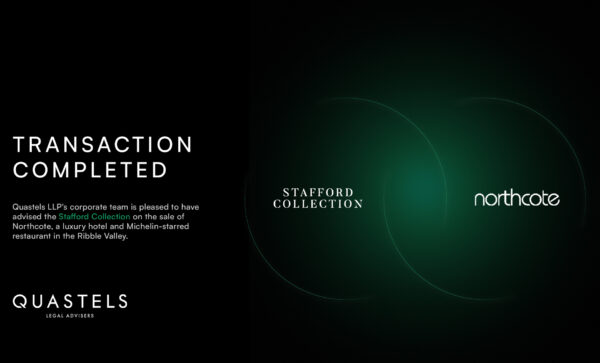Latest Posts

Celebrating New Promotions and Milestones at Quastels
At Quastels, the strength of our firm lies in the outstanding individuals who drive innovation, deliver exceptional client service, and embody our values. We are delighted to announce a series of well-deserved promotions that reflect the continuing growth of our practice and the bright future ahead.
Lin Li
Lin Li has been promoted to Senior Associate in our Immigration team. Lin is highly regarded for her technical expertise across a wide range of immigration matters, including complex corporate immigration, family visas, British nationality applications, and sponsor licences. Fluent in Mandarin and Cantonese, Lin has build a reputation for her client-centric approach, guiding both businesses and individuals through the evolving UK immigration landscape with skill and empathy. Her promotion recognises her outstanding contributions to the firm’s expanding immigration practice.
Ann Goh
Ann Goh has been promoted to Associate in our Litigation and Dispute Resolution Department. As a key member of the team, Ann advises on a broad spectrum of general commercial and insolvency matters, including contractual disputes of all kinds, civil fraud, company and partner disputes, and insolvency and restructuring. She is regularly instructed in complex/multi-jurisdictional matters and is consistent in delivering results for her clients. Ann’s promotion reflects not only her continued commitment to excellence but also her growing influence within the team and the depth of expertise within our disputes practice.
Florence Wilson-Gunn
We are equally proud to announce that Florence Wilson-Gunn has qualified as a Solicitor and joins our Dispute Resolution team following the successful completion of her training contract at Quastels. Florence has worked across a number of departments during her training, gaining wide-ranging experience and demonstrating exceptional diligence, adaptability, and a clear passion for dispute resolution. We are excited to see Florence continue to develop her practice as she embarks on this next stage of her career with us.
These promotions are a testament to the extraordinary calibre of our team at Quastels. We are committed to investing in the growth and development of our people as part of our long-term strategy to remain a destination firm for both talented lawyers and clients seeking cutting-edge legal advice.
Congratulations to Lin, Ann, and Florence on these well-earned milestones. We are excited for what the future holds.
Read More
Quastels Advises the Stafford Collection on the Sale of Luxury Hotel & Michelin-Starred Restaurant, Northcote
Quastels LLP’s corporate team is pleased to have advised the Stafford Collection on the sale of Northcote, a luxury hotel and Michelin-starred restaurant in the Ribble Valley. The disposal marks a strategic milestone for the Stafford Collection as it concentrates on enhancing its flagship property, The Stafford London, and pursuing new growth opportunities.
The transaction was led by Adam Convisser, Marcus Rebuck and Nilam Davé from our corporate team.
This high-profile deal highlights Quastels’ deep expertise in the hospitality sector, where we regularly support clients on strategic acquisitions, disposals, and group restructurings. The sale of Northcote further strengthens our track record acting for premium brands and luxury operators in the UK and internationally.
A representative of the Stafford Collection commented:
“We are deeply grateful for the support provided by Quastels on this transaction. They were commercial, technically excellent, and completely aligned with our goals. Their deep understanding of the sector made all the difference.”
We are proud to have supported the Stafford Collection on this important transaction. It is a pleasure to work with a client that has such a clear vision for the future of luxury hospitality.
Read More
Compliance Beyond Obligation: Why Non-Scoped Suppliers Need to Embrace ESG
In an era where Environmental, Social, and Governance (ESG) criteria are becoming increasingly important, businesses are grappling with regulatory compliance. However, an intriguing dynamic has emerged: suppliers who are not directly in scope for mandatory ESG regulations may still find themselves compelled to comply. This article explores why suppliers, who are themselves outside the scope of regulation may need to adopt ESG practices due to their position within broader supply chains.
The Ripple Effect of ESG Regulations
At the heart of ESG regulations lies a commitment to sustainability, ethical practices, and governance standards that transcend individual companies. Governments and regulatory bodies have rolled out ESG laws and regulations requiring large corporations adhere to stringent ESG criteria. These regulations often focus on industries with significant environmental footprints or high-risk governance structures. Yet, the influence of these regulations extends far beyond the large entities that come within their scope, creating a ripple effect that permeates entire supply chains.
The Role of Corporate Responsibility and Supply Chain Pressure
Large corporations, driven by regulatory requirements and stakeholder expectations, are increasingly holding their suppliers accountable for ESG standards. These corporations are keenly aware that their own compliance and reputational standing hinge on the practices of their entire supply chain. As a result, they exert pressure on their suppliers to align with their ESG policies, even if those suppliers are not directly regulated.
For example, a multinational corporation may be mandated to reduce its carbon footprint. To meet these requirements, it will scrutinise its suppliers’ environmental practices, ensuring that raw materials are sourced sustainably, and that manufacturing processes are energy efficient. This trickle-down effect necessitates that suppliers must adopt ESG measures in order to maintain their business relationships with these larger, regulated entities.
Market Expectations and Competitive Advantage
Beyond regulatory pressures, market expectations are a powerful driver for ESG compliance. Investors, consumers, and other stakeholders are increasingly prioritising sustainability and ethical business practices. Companies that demonstrate robust ESG performance often enjoy enhanced brand loyalty, investor confidence, and market competitiveness. Therefore, suppliers who wish to do business with ESG-focused companies must proactively integrate ESG principles into their operations.
Moreover, suppliers who embrace ESG practices can gain a competitive edge. By demonstrating their commitment to sustainability, they position themselves as preferred partners for leading corporations, potentially opening doors to new business opportunities and long-term contracts. In contrast, those who lag in ESG compliance risk being overlooked or even replaced by more responsible competitors.
Risk Management and Long-Term Viability
Adopting ESG practices is also a strategic move for risk management and long-term viability. Environmental risks, such as resource scarcity and climate change, pose significant threats to supply chain stability. Social risks, including employment disputes and community backlash, can disrupt operations. Governance risks, such as corruption and non-compliance, can lead to legal complications and reputational damage.
Suppliers who proactively address these risks through ESG initiatives can pro-actively guard against potential disruptions and safeguard their operations. By fostering a culture of sustainability and ethical governance, they enhance their resilience and ensure continued alignment with the evolving expectations of regulators, partners, and consumers.
The Path Forward: Proactive ESG Integration
For suppliers outside the direct scope of mandatory ESG regulations, the path forward lies in proactive integration of ESG principles. This involves conducting thorough assessments of their environmental impact, social practices, and governance structures. By setting clear ESG goals, investing in sustainable technologies, and fostering a culture of transparency, suppliers can effectively align with the broader ESG ecosystem.
Additionally, collaboration and communication within the supply chain are crucial. Suppliers should engage in open dialogues with their clients, understand their ESG requirements, and seek guidance on best practices. By building strong, trust-based relationships, suppliers can navigate the complexities of ESG compliance and contribute positively to the collective sustainability efforts.
Conclusion
In conclusion, while mandatory ESG regulations may not directly target all suppliers, the interconnected nature of modern supply chains necessitates that even those suppliers not in scope for mandatory regulations should adopt ESG practices. The ripple effect of regulatory pressure, market expectations, competitive advantage, and risk management underscores the importance of ESG compliance for long-term success. By embracing proactive ESG integration, suppliers can not only meet the demands of their partners but also position themselves as responsible and resilient players in an increasingly sustainability-focused business landscape.
To discuss any of the points raised in this article, please contact Ann-Maree Blake or fill in the form below.
Read More